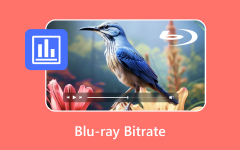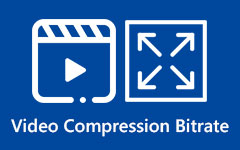What is bitrate? Is a higher bitrate always better? What is the best bitrate for 1080p videos? If you have had any of these questions, you are in the right place. Understanding bitrate can be tricky, but it is essential to get the right video quality and manage file sizes.
In this article, we will cover all the things you need to know about bitrate, like how it affects your video and how to choose the right one for your videos. In addition, we will teach you how to change video bitrate if you need it.
Without further ado, let us dive in and make bitrate easier to understand!

Part 1. What Is Bitrate
Let us start by defining bitrate. So, what is bitrate?
The amount of data used every second is called bitrate. It helps videos look smooth and sound clear. Bitrate is how much data is used to play a video or sound every second. It is written in kbps (kilobits per second) or Mbps (megabits per second).
A higher bitrate means better quality. But it also means the file is bigger. A lower bitrate means smaller files. But it may look blurry or choppy. So, bitrate tells us how much detail is inside the video or audio.
Part 2. How Does Bitrate Affect Video Quality
When you watch a video, sometimes it looks clear. Other times, it seems messy. Bitrate is one big reason for that.
Bitrate affects how sharp, smooth, or clear a video looks.
- High bitrate - Clearer video and more details.
- Low bitrate - Blurry video and fewer details.
So, how do you know what bitrate is good? If the bitrate is too low, you may see blocks or fuzz in the picture. If the bitrate is too high, it may not play well on slow internet. So, you need the correct bitrate to get good quality and smooth play.
Part 3. Suggested Video Bitrates
To help videos look good, you need the correct bitrate. Not too high. Not too low. It depends on the video's size and how fast the internet is.
Here are some bitrate tips for common video types:
- 360p video: 600 - 1,000 kbps
- 480p video: 1,000 - 2,500 kbps
- 720p HD video: 2,500 - 5,000 kbps
- 1080p Full HD video: 4,000 - 8,000 kbps
- 1440p (2K): 10,000 - 20,000 kbps
- 2160p (4K): 20,000 - 50,000 kbps
Part 4. Bitrate vs Resolution - What Is the Difference
Bitrate and resolution both help make a video look good. But they are not the same thing. One controls size. The other controls detail. Let us break it down.
| Bitrate | Resolution | |
|---|---|---|
| What it is | How much data is used every second | How many pixels are in the video screen |
| Main job | Makes video smoother and clearer | Makes video sharper and bigger |
| Looks like | 1,000 kbps, 5,000 kbps, or 20,000 kbps | 360p, 720p, 1080p, or 4K |
| Measured in | Kbps or Mbps (speed of data) | Pixels (height of the screen in lines) |
| Changes what | Quality, file size, and how fast it loads | How sharp or soft the video picture looks |
| Too low? | Video looks blocky, blurry, or freezes | The video looks small or less sharp |
| Too high? | The file gets big and needs fast internet to stream | Uses more pixels but still needs a high bitrate |
| Needs what? | Balance with a resolution to look best | Balance with bitrate to look best |
| Show MoreShow Less | ||
Quick Notes:
A high-resolution video can still look bad if the bitrate is low. On the other hand, a low-resolution video can look okay if the bitrate is good. With that being said, they work best when both are in balance.
Part 5. How to Change Video Bitrate
Now that you know what bitrate is in video and how it changes video quality, you might realize your video does not look good. It could be too blurry. The file may be too big. It may not play well on your phone or website. It is when you need to change the bitrate. You do not need to start over. You need a tool that lets you adjust the bitrate the right way.
Tipard Video Converter Ultimate is that tool. It works on Windows and Mac. It lets you change the bitrate from 1,000 kbps up to 30,000 kbps. You can make your video look better or make the file smaller. You can even adjust the frame rate, resolution, and the encoder. That means you control how the video looks, how big it is, and where it will play.
The impressive part is that you can import as many videos as you want and process them at once, as it supports batch processing. Plus, the steps are just easy to follow, and we are here to guide you throughout the process.
- Trim, crop, or cut videos before saving.
- Keeps good quality even at lower file sizes.
- Offers many video and audio editing features.
- Change video bitrate between 1,000 kbps and 30,000 kbps.
- Pick any video format, like MP4, MOV, MKV, AVI, and more.

Step 1Go to the official Tipard Video Converter Ultimate website. Please download the program for Windows or Mac. After downloading, install it. When it is ready, open the program.
Step 2The good thing is that you are already directed to the Converter tab. Press the big + button in the center. It lets you choose the video from your computer. Pick the file for which you want to change the bitrate.
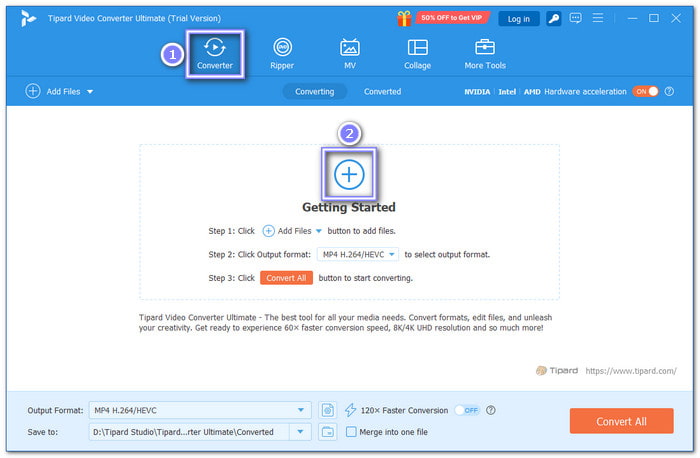
Step 3After adding the video, look for the Profile button next to your file and click it. A menu will show up. Pick the format you like, such as MP4 or MOV. Then, press the Gear or Cogwheel button beside the format. It opens the Settings window.
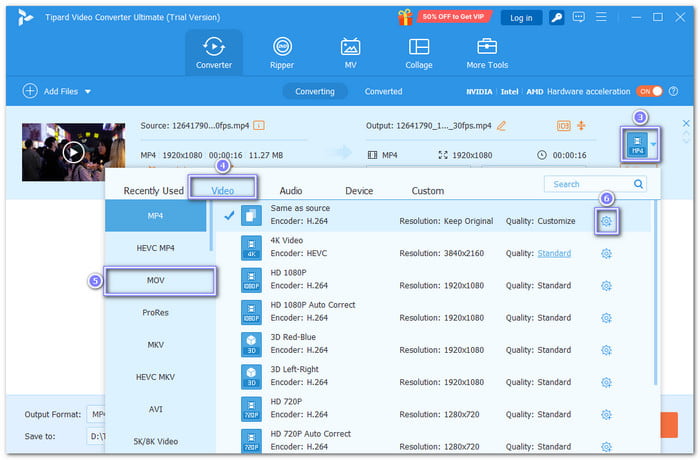
Step 4In the settings, go to the Video section. You can change the Bitrate here. For good quality, use 3,500 to 5,000 Kbps for 1080p videos. If you want a smaller file, try 2,000 Kbps for 720p. Want very high quality? Use 8,000 Kbps or more, but only if you have space.
You can also change the Resolution, Frame Rate, and Encoder if needed. When ready, press Create New to save your new settings.
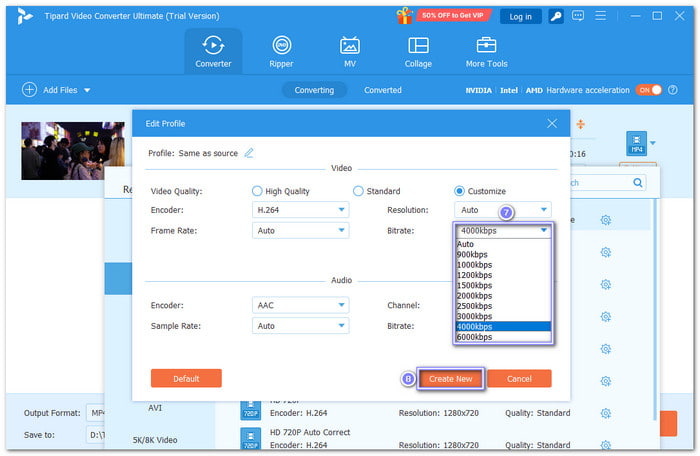
Step 5Now, click Convert All at the bottom. The program will change your video with the new bitrate. After a few seconds, your file will be saved on your computer.
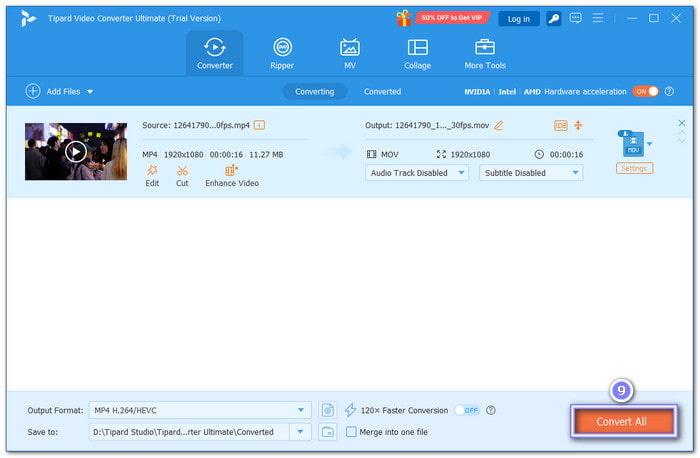
Conclusion
Now you know what video bitrate is. You learned it affects how clear your video looks. A higher bitrate means better quality. You also learned that bitrate is not the same as resolution. They work together, but they are not the same thing.
If you ever need to change the bitrate of your video, you do not have to worry. Tipard Video Converter Ultimate makes it easy. You can set the bitrate to anything you want, from 1,000 kbps up to 30,000 kbps. You can even change the format, resolution, frame rate, and encoder too. You can change one video or many with its support for batch processing!


